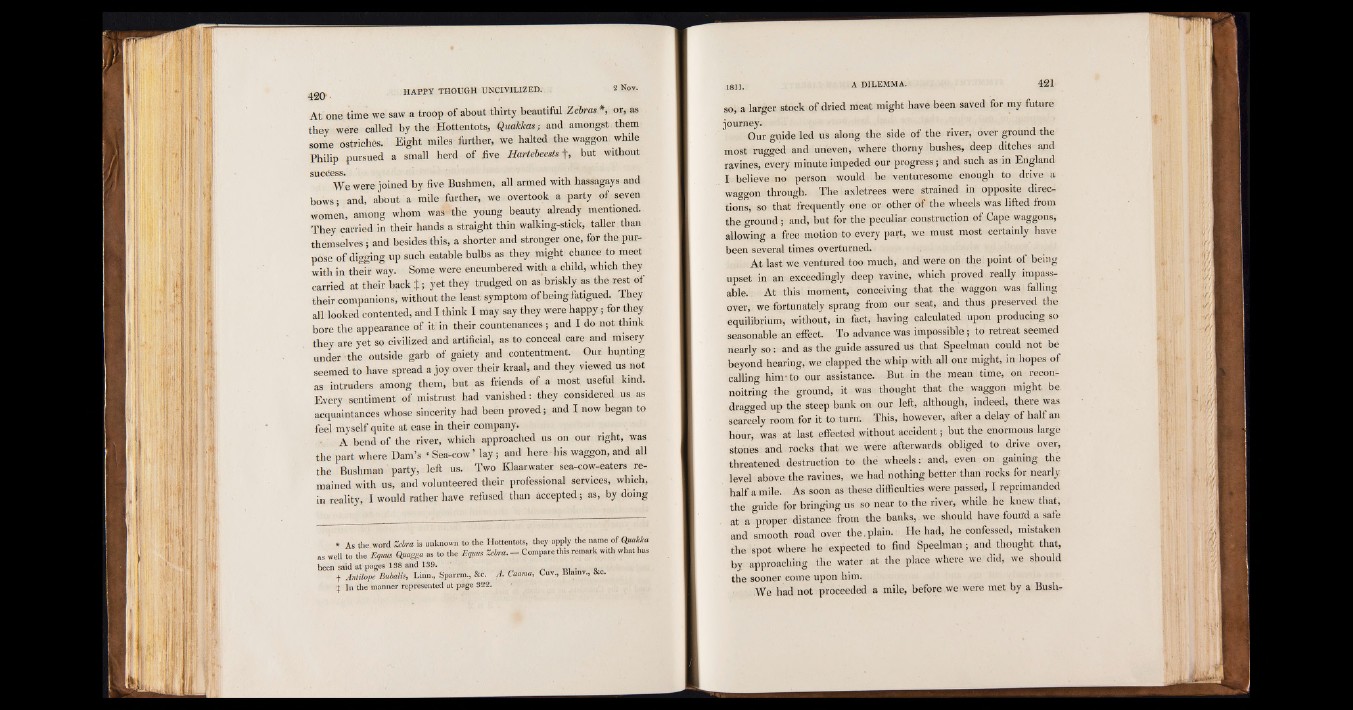
4 2 0 , HAPPY THOUGH UNCIVILIZED. 2 Nov.
At one time we saw a troop of about thirty beautiful Zebras*, or, as
they were called by the Hottentots, Quakkas; and amongst them
some ostriches. Eight miles further, we halted the waggon while
Philip pursued a small herd of live Hartebeests j", but without
success.
We were joined by five Bushmen, all armed with hassagays and
bows; and, about a mile further, we overtook a party of seven
women, among whom was the young beauty already mentioned.
They carried in their hands a straight thin walking-stick, taller than
themselves; and besides this, a shorter and stronger one, for the purpose
of digging up such eatable bulbs as they might chance to meet
with in their way. Some were encumbered with a child, which they
carried at their back } ; yet they trudged on as briskly as the rest of
their companions, without the least symptom of being fatigued. They
all looked contented, and I think I may say they were happy ; for they
bore the appearance of it in their countenances ; and I do not thmk
they are yet so civilized and artificial, as to conceal care and misery
under the outside garb of gaiety and contentment. Our hunting
seemed to have spread a joy over their kraal, and they viewed us not
as intruders among them, but as friends of a most useful kind.
Every sentiment of mistrust had vanished: they considered us as
acquaintances whose sincerity had been proved; and I now began to
feel myself quite at ease in their company.
A bend of the river, which approached us on our right, was
the part where Dam’s ‘ Sea-cow’ lay; and here his waggon, and all
the Bushman party, left us. Two Klaarwater sea-cow-eaters remained
with us, and volunteered their professional services, which,
in reality, I would rather have refused than accepted; as, by doing
* As the word Zebra is unknown to the Hottentots, they apply the name of Quak
as well to the Eqirns Qtmgga as to the EqVm Zebra. — Compare this remark with what I
been said at pages 138 and 139.
f Antilope Bubalis, Linn., Sparrm., &c. A. Caama, Cuv., Blainv., &c.
if In the manner represented at page 322.
18I1# A DILEMMA. 4 2 1
so, a larger stock of dried meat might have been saved for my future
journey. %
Our guide led us along the side of the river, over ground the
most rugged and uneven, where thorny bushes, deep ditches and
ravines, every minute impeded our progress; and such as in England
I believe no person would be venturesome enough to drive a
waggon through. The axletrees were strained in opposite directions,
so that frequently one or other of the wheels was lifted from
the ground; and, but for the peculiar construction of Cape waggons,
allowing a free motion to every part, we must most certainly have
been several times overturned.
At last we ventured too much, and were on the point of being
upset in an exceedingly deep ravine, which proved really impassable.
At this moment, conceiving that the waggon was falling
over, we fortunately sprang from our seat, and thus preserved the
equilibrium, without, in fact, having calculated upon producing so
seasonable an effect. To advance was impossible; to retreat seemed
nearly so: and as the guide assured us that Speelman could not be
beyond hearing, we clapped the whip with all our might, in hopes of
calling him-to our assistance. But in the mean time, on reconnoitring
the ground, it was thought that the waggon might be
dragged up the steep bank on our left, although, indeed, there was
scarcely room for it to turn. This, however, after a delay of half an
hour, was at last effected without accident; but the enormous large
stones and rocks that we were afterwards obliged to drive over,
threatened destruction to the wheels: and, even on gaining the
level above the ravines, we had nothing better than rocks for nearly
half a mile. As soon as these difficulties were passed, I reprimanded
the guide for bringing us so near to the river, while he knew that,
at a proper distance from the banks, we should have found a safe
and smooth road over the,plain. He had, he confessed, mistaken
the spot where he expected to find Speelman; and thought that,
by approaching the water at the place where we did, we should
the sooner come upon him.
We had not proceeded a mile, before we were met by a Bush